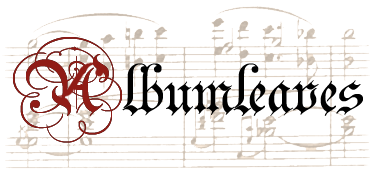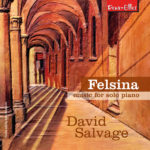Robert Schumann zum 200. Geburtstag!
In many a sleepless night I behold a far-away picture, like a goal. –While writing down the Papillons I truly feel a certain independence trying to develop itself. This is, however, the sort of thing that the critics usually reject. –Now the Papillons flutter in the wide, glorious world of Spring. Spring itself stands outside the door and gazes at me—a child with heavenly blue eyes. –And now I begin to comprehend my own existence.
–Robert Schumann to his mother, May 3, 1832 (Trans. Robert Haven Schauffler)
Introduzione
I
As he walked out of the small chamber, he begged God that he would happily find it again; he felt as if he were a hero thirsty for glory who embarks on his first battle . . .
II
Due to the sort of wrong turn that plagued his life, he entered first into the punch room which he had mistaken for the dance hall . . . He did not see Wina, nor was there any sign of Vult . . . Following his inclination to examine the overflowing adjacent room, he came upon the correct hall, echoing, burning, full of seething figures . . .
III
What drew his attention and astonishment most was a giant boot skidding around, seemingly worn only by itself . . .
IV
Hope [as which the young maiden was dressed] quickly turned around: an unmasked sleeping woman approached as did a modest nun in a half mask and with a fragrant strand of auricula.
V
Now he stood alone for a second next to the peaceful young maiden, whose charm emanated from behind her half mask like the promise of a glimpse of a rose’s or a lily’s face from behind a sinking bud. As foreign spirits in distant twilit skies, they saw each other behind the dark masks, exactly like stars in a solar eclipse, and each soul saw the other in the distance.
VI
Don’t take it badly, but in this hall your waltzing so far counts only as a good mimicking imitation; your steps have the waggoner’s side-to-side and the miner’s up-and-down manner.
VII
He tossed his mask aside and a strange, hot desert dryness or dry feverishness broke into his mien and words. If you bear some love for your brother, he began in a dry voice and accepted the crown and loosened the housedress, if you value the quenching of an innermost desire for something and if your happiness is not indifferent as to whether he should have the smallest or greatest, if you will just hear one of his most beseeching requests—[connects with IX]
VIII
As a youth touches the hand of a great and famous author, so, like a butterfly’s wings, like auricula petals, he softly touched Wina’s back and lost himself in limitless distance in order to see her living, breathing face. Be there a harvest dance that is the harvest, a fire wheel of passionate enchantment; to Walt, the waggoner had both.
IX
[connects with VII] –then I can only answer you this: With joy. “Let’s get it over with,†replied Wult without thinking.
X
When he entered, it seemed to Walt as if everyone wanted to exchange masks with him; a few women noticed that, behind the flowers, Hope now had blonde hair (unlike earlier), and Walt’s steps were smaller and more ladylike, as would have been appropriate for Hope. But he soon forgot himself and the hall and everything, as the waggoner Vult, partnered at the dizzying peak of the English dance with Wina, broke off dancing without reason and, artfully casting her aside, began moving his feet—seemingly painting with the great decorative strokes of a painter.. . .
Later, at the end of the dance, amongst hurriedly reaching hands making lines criss-crossed and up and down, Vult allowed himself to escape from the strains of the Polish guitar—now only breaths of talking, and now undulating at sea with the butterflies of a distant island. To Wina the talking around her resonated like the summer night’s song of a seldom-heard lark.
Papillon XI.
Papillon XII. Finale
Schumann did not indicate corresponding texts for numbers XI and XII.
The texts come from Jean-Paul’s Flegeljahre, a novel the author did not finish.
Source: Wolfgang Boetticher. Schumann. pp. 611-613. (My own translation.)


